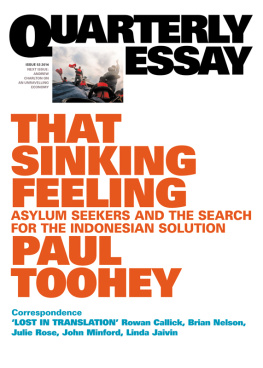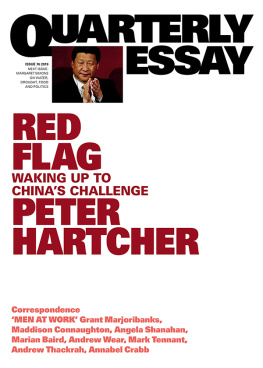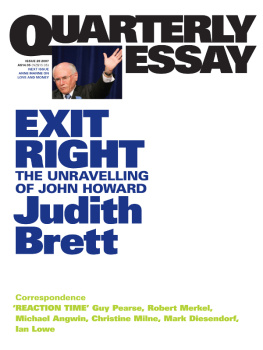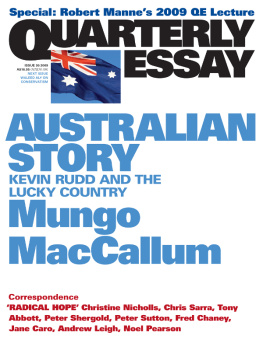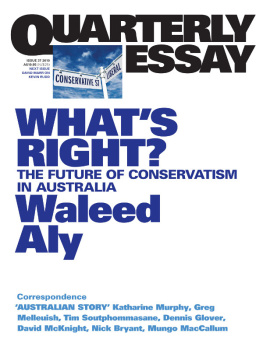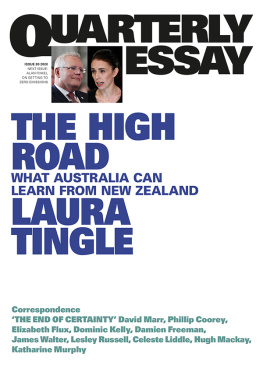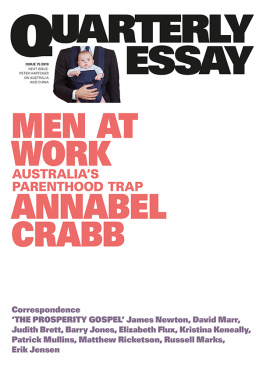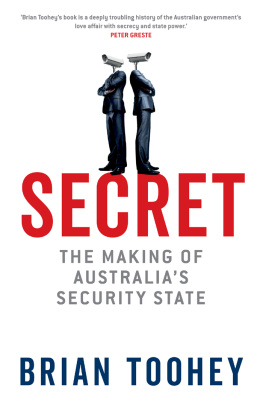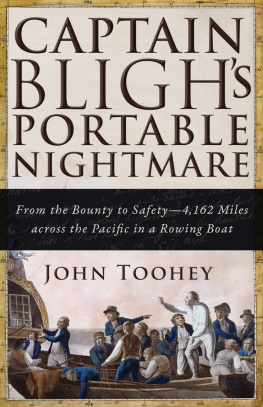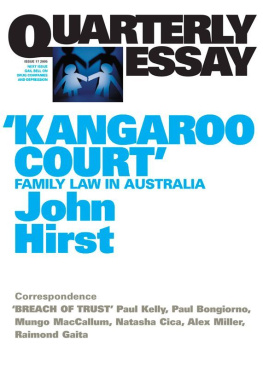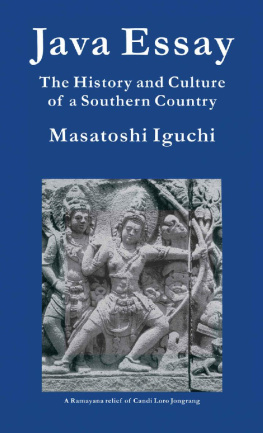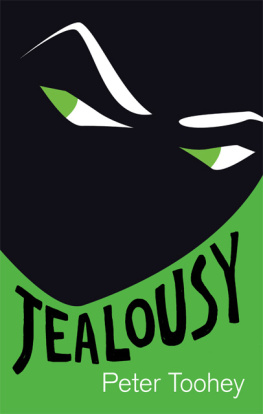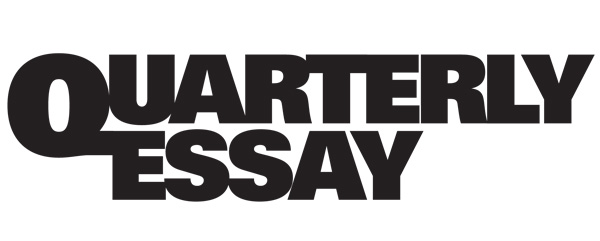THAT SINKING FEELING
Asylum Seekers and the Search for the Indonesian Solution
Paul Toohey
ALI REZA AND THE TWENTY ASYLUM SEEKERS
All the frustration and hatred Ali Reza Bahrami had ever known welled within him and spilled forth. It was directed at a group of Iranian asylum seekers, all of them men, all of them in the final stages of preparation to catch a boat from Indonesia to Australia. Reza was walking in angry circles, punching his chest, defining himself, standing his ground, poking his finger sharply into Iranian chests. He was just one young man, aged twenty-three, and an Afghan. He was badly outnumbered in terms of ethnicity and physical size, but he refused to back down.
We felt some responsibility for Reza, who had been acting as our informal translator and guide in the small mountaintop city of Cisarua, in central West Java, the place where most of the asylum seekers wanting to get to Australia come to find a smuggler and passage south. Reza was digging himself deeper, abusing the Iranians in their own Farsi language, one of the many in which he was fluent. Some of the Iranians were kissing him on the face, telling him to calm down. Others looked menacing. I got the feeling Reza was about to be stabbed. Our appeals for Reza to get control of himself were under assault from his own rising fury, as he screamed that he would never again, under any circumstance, explain himself to an Iranian.
After two years of living in Cisarua, and three in Malaysia before that, Reza knew the local asylum scene intimately who was passenger or smuggler, old hand or recent arrival. Reza had brought us up a steep narrow road to a villa, occupied by twenty or more Iranian men. We were in a smugglers villa and ought not have been there. We had asked Reza if he knew a group that was ready to sail. He said he did and had brought us straight here. He had earlier befriended one of the members of this group, who were now on standby, ready to shift at a moments notice in mini-vans or trucks down to the southern coast and onto a smugglers boat.
In only one sense was this group any different to the other small groups of mostly Afghans and Iranians who openly wandered this hilltop town, bored, using the internet cafs, window shopping the things theyd seen many times before, buying nothing but essentials because they would need their money further down the line, hopefully in Australia. These Iranians were quarantined, meaning no contact with any outsiders. They were tour packaged for Christmas Island, ready to sail. It was Friday 20 July 2013. Initially, with Reza translating, everything had gone well.
The conversation was very different to what it would have been in this same city in late 2007, when Kevin Rudd, as the new prime minister, ordered Manus Island and Nauru to close on humanitarian grounds and ended the temporary protection visa program.* Back then it was difficult to get anyone in Cisarua to admit they were trying to take a boat. They would swear they were there to register with the United Nations High Commissioner for Refugees (UNHCR), to gain formal status as refugees, and ideally to have their accommodation and a living stipend paid by the International Organization for Migration (IOM) as they awaited orderly resettlement in a First World country which they prayed would be Australia. Some of them, particularly the single mothers with clutches of children, said they were prepared to wait for years, if thats what it took, in the hope of resettlement even though they had just a one in ten chance of getting one of the 80,000 annual global resettlement places on offer. But most were there for the boats.
* Temporary protection visas required holders to reapply for a second TPV after three years, with the prospect of being sent home if home conditions were deemed improved. Holders were also denied access to family reunion programs and barred from returning to Australia should they leave for any reason.
Rudd could afford the luxury of a conscience, then, because he had arrived in office to find the Manus and Nauru offshore facilities all but empty, and it was deemed that temporary protection visas were too harsh. There were no boats, apart from the odd freak vessel. By general agreement, John Howard, assisted by a lull in international people flows, had stopped them.
Rudds shift soon aroused interest in South Asia the countries from Afghanistan down to Sri Lanka and the Middle East, in places such as Quetta, Kabul, Kandahar, Tehran and Abadan City, home to high numbers of discontented and at-risk people. Some of these began to move down to Indonesia again. At first, most were Afghan Hazaras and Sri Lankan Tamils, who were coming to the losing end of a 26-year civil war. There were also people from Burmas Muslim Rohingya minority, though they were scattered and disorganised, more downtrodden and less able to raise the smugglers fees. Slower to move, initially, were the Iranians, although they would soon begin to gather in great numbers.
They entered Indonesia in various ways. Most, excepting the Iranians, could not turn up at Jakartas Soekarno-Hatta International Airport and apply for visas-on-arrival. The Sri Lankans would set sail east across the Indian Ocean for Malaysia, or the westernmost Indonesian island of Sumatra, where they would find smugglers to ferry and bus them to the central West Java province of Bogor, where Cisarua is located. Those coming from the neighbourhoods of Afghanistan and Pakistan would fly to Malaysia, which issued visas-on-arrival to most nationalities, and catch inter-island ferries to Indonesia. These were usually the smaller groups, who were not as yet in the hands of smugglers or their agents. But they typically had the name and number of someone who could help, or had plans to meet some of their own people in Indonesia and gain introduction to a smuggler. Others, particularly the Iranians, had been flying directly to Jakarta as half-disguised tour groups, sometimes with an agent on the same flight herding them through. That was until Indonesia banned on-the-spot visas for Iranians in mid-2013, supposedly in response to a personal request from Rudd to President Susilo Bambang Yudhoyono (so it was reported in Australia, but later, when things went bad during the spying scandal, senior Indonesian ministers would say theyd cut the visa-on-arrival program not to help Australia, but because too many Iranians were bringing drug problems to Indonesia).
Sri Lankans liked to avoid attention and were hustled down to Bogor to disappear into their own networks, lying low. Most of the other groups moved more openly. Upon arrival in Jakarta, they would book into one of several usual-suspect hotels, where they would meet their smuggler and do business. It was important to asylum seekers that they did this face-to-face, preferably with someone from their own country or ethnicity.
People shopped with smugglers who had a reputation for getting people to Christmas Island safely. Death-boat smugglers went out of business, or kept operations going by hiding in the shadows behind lieutenants. Not only were passengers investing what might amount to their earthly wealth, they were often travelling with children and wanted assurances the boats were safe. They also wanted to know that they would not be arrested in Indonesia. Such guarantees were easily given. These customersmuggler meetings showed how intimate the operations were. After the asylum trade restarted in early 2008, the Australian Federal Police in Jakarta would come to the view that there were not really any smuggling Mr Bigs, not in the sense of snakehead triad bosses or masterminds hiding behind complex walls of front companies. They were small-time businessmen crooks, usually from Iraq, Iran or Afghanistan, living openly in Jakarta and growing rich on the proceeds of smuggling.

